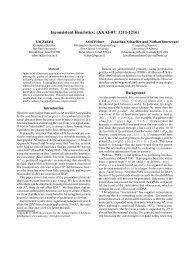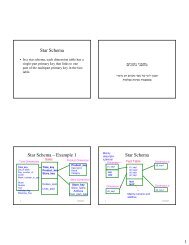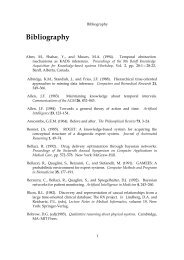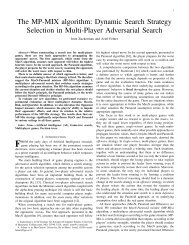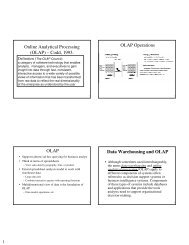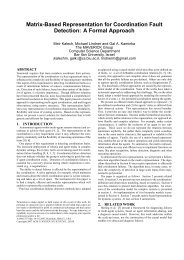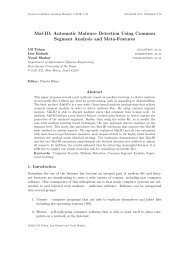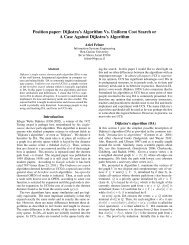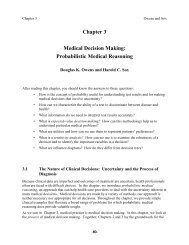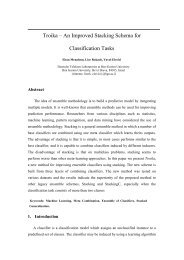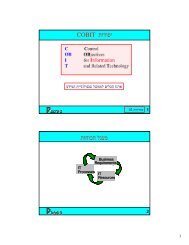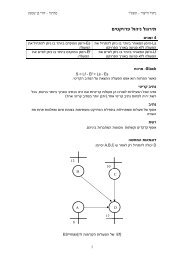BnB-ADOPT: An Asynchronous Branch-and-Bound DCOP Algorithmâ
BnB-ADOPT: An Asynchronous Branch-and-Bound DCOP Algorithmâ
BnB-ADOPT: An Asynchronous Branch-and-Bound DCOP Algorithmâ
You also want an ePaper? Increase the reach of your titles
YUMPU automatically turns print PDFs into web optimized ePapers that Google loves.
<strong>DCOP</strong> Algorithm Search Strategy Synchronization Communication Topology<br />
SBB [6] DF<strong>BnB</strong> synchronous point-to-point with neighbors constraint chain<br />
<strong>ADOPT</strong> [12] best-first asynchronous point-to-point with neighbors constraint tree<br />
NCBB [3] DF<strong>BnB</strong> synchronous point-to-point with neighbors constraint tree<br />
AFB [4] DF<strong>BnB</strong> asynchronous broadcast constraint chain<br />
<strong>BnB</strong>-<strong>ADOPT</strong> DF<strong>BnB</strong> asynchronous point-to-point with neighbors constraint tree<br />
Table 1: Properties of <strong>DCOP</strong> Algorithms<br />
exploit the heuristics quite as well but does not have to repeatedly<br />
reconstruct partial solutions that it purged from<br />
memory. Thus, <strong>ADOPT</strong> benefits from well informed heuristics.<br />
This intuition explains why <strong>ADOPT</strong> can be faster than<br />
<strong>BnB</strong>-<strong>ADOPT</strong> for small <strong>DCOP</strong> problems. We confirm our intuition<br />
with an additional experiment on small <strong>DCOP</strong> problems<br />
for allocating four targets to sensors, where we vary the<br />
quality of the heuristics. We use h ′ = w ×h for 0.5 ≤ w ≤ 1,<br />
where h are the heuristics used before. Indeed, <strong>ADOPT</strong><br />
can be faster than <strong>BnB</strong>-<strong>ADOPT</strong> for large values of w, that<br />
is, well informed heuristics. The runtime of <strong>ADOPT</strong> depends<br />
much more on the informedness of the heuristics than<br />
the runtime of <strong>BnB</strong>-<strong>ADOPT</strong> since <strong>ADOPT</strong> relies on the<br />
heuristics more than <strong>BnB</strong>-<strong>ADOPT</strong>. <strong>BnB</strong>-<strong>ADOPT</strong> tends to<br />
be faster than <strong>ADOPT</strong> for small values of w, that is, poorly<br />
informed heuristics. Thus, <strong>BnB</strong>-<strong>ADOPT</strong> has great potential<br />
as a <strong>DCOP</strong> algorithm since heuristics are often poorly informed<br />
for difficult <strong>DCOP</strong> problems, such as problems with<br />
large numbers of agents, large numbers of values, large numbers<br />
of constraints <strong>and</strong> large variations in constraint costs.<br />
5. CONCLUSIONS<br />
We introduced <strong>BnB</strong>-<strong>ADOPT</strong>, a memory-bounded asynchronous<br />
<strong>DCOP</strong> algorithm that uses the message passing<br />
<strong>and</strong> communication framework of <strong>ADOPT</strong> but changes<br />
the search strategy from best-first search to depth-first<br />
branch-<strong>and</strong>-bound search (DF<strong>BnB</strong>). Figure 1 shows how<br />
the properties of <strong>BnB</strong>-<strong>ADOPT</strong> compare to those of other<br />
memory-bounded <strong>DCOP</strong> algorithms. Our experimental results<br />
showed that <strong>BnB</strong>-<strong>ADOPT</strong> was up to one order of magnitude<br />
faster than <strong>ADOPT</strong> on a variety of large <strong>DCOP</strong> problems<br />
(since <strong>ADOPT</strong> uses memory-bounded best-first search<br />
<strong>and</strong> thus needs to repeatedly reconstruct partial solutions<br />
that it purged from memory) <strong>and</strong> faster than NCBB on most<br />
of these <strong>DCOP</strong> problems (since NCBB is synchronous <strong>and</strong><br />
agents are thus often idle while waiting for activation messages<br />
from other agents). It is future work to improve <strong>BnB</strong>-<br />
<strong>ADOPT</strong> <strong>and</strong> <strong>ADOPT</strong> further, for example, to reduce the<br />
number of messages sent. It is also future work to compare<br />
<strong>BnB</strong>-<strong>ADOPT</strong> to additional <strong>DCOP</strong> algorithms. We have not<br />
compared <strong>BnB</strong>-<strong>ADOPT</strong> to DPOP [13] in this paper since<br />
DPOP is not memory-bounded, which can make its application<br />
infeasible in domains where each agent has only a<br />
limited amount of memory available, such as for allocating<br />
targets to sensors. We have not compared <strong>BnB</strong>-<strong>ADOPT</strong> to<br />
OptAPO [9] in this paper since OptAPO is partially centralized,<br />
which can make its application infeasible in domains<br />
with privacy concerns, such as for scheduling meetings. We<br />
have not compared <strong>BnB</strong>-<strong>ADOPT</strong> to SBB [6] in this paper<br />
since it has already been shown that <strong>ADOPT</strong> outperforms<br />
SBB [12]. These comparisons as well as the comparison of<br />
<strong>BnB</strong>-<strong>ADOPT</strong> to AFB [4] are topics of future work.<br />
6. REFERENCES<br />
[1] S. Ali, S. Koenig, <strong>and</strong> M. Tambe. Preprocessing techniques<br />
for accelerating the <strong>DCOP</strong> algorithm <strong>ADOPT</strong>. In<br />
Proceedings of AAMAS, pages 1041–1048, 2005.<br />
[2] C. Bessiere, A. Maestre, <strong>and</strong> P. Messeguer. Distributed<br />
dynamic backtracking. In Proceedings of the Distributed<br />
Constraint Reasoning Workshop, pages 9–16, 2001.<br />
[3] A. Chechetka <strong>and</strong> K. Sycara. No-commitment branch <strong>and</strong><br />
bound search for distributed constraint optimization. In<br />
Proceedings of AAMAS, pages 1427–1429, 2006.<br />
[4] A. Gershman, A. Meisels, <strong>and</strong> R. Zivan. <strong>Asynchronous</strong><br />
forward-bounding for distributed constraints optimization.<br />
In Proceedings of ECAI, pages 103–107, 2006.<br />
[5] P. Hart, N. Nilsson, <strong>and</strong> B. Raphael. A formal basis for the<br />
heuristic determination of minimum cost paths. IEEE<br />
Transactions on Systems Science <strong>and</strong> Cybernetics,<br />
SSC4(2):100–107, 1968.<br />
[6] K. Hirayama <strong>and</strong> M. Yokoo. Distributed partial constraint<br />
satisfaction problem. In Principles <strong>and</strong> Practice of<br />
Constraint Programming, pages 222–236, 1997.<br />
[7] R. Korf. Linear-space best-first search. Artificial<br />
Intelligence, 62(1):41–78, 1993.<br />
[8] R. Maheswaran, M. Tambe, E. Bowring, J. Pearce, <strong>and</strong><br />
P. Varakantham. Taking <strong>DCOP</strong> to the real world: Efficient<br />
complete solutions for distributed event scheduling. In<br />
Proceedings of AAMAS, pages 310–317, 2004.<br />
[9] R. Mailler <strong>and</strong> V. Lesser. Solving distributed constraint<br />
optimization problems using cooperative mediation. In<br />
Proceedings of AAMAS, pages 438–445, 2004.<br />
[10] R. Marinescu <strong>and</strong> R. Dechter. AND/OR branch-<strong>and</strong>-bound<br />
for graphical models. In Proceedings of IJCAI, pages<br />
224–229, 2005.<br />
[11] A. Meisels, E. Kaplansky, I. Razgon, <strong>and</strong> R. Zivan.<br />
Comparing performance of distributed constraints<br />
processing algorithms. In Proceedings of the Distributed<br />
Constraint Reasoning Workshop, pages 86–93, 2002.<br />
[12] P. Modi, W. Shen, M. Tambe, <strong>and</strong> M. Yokoo. <strong>ADOPT</strong>:<br />
<strong>Asynchronous</strong> distributed constraint optimization with<br />
quality guarantees. Artificial Intelligence, 161(1-2):149–180,<br />
2005.<br />
[13] A. Petcu <strong>and</strong> B. Faltings. A scalable method for multiagent<br />
constraint optimization. In Proceedings of IJCAI, pages<br />
1413–1420, 2005.<br />
[14] N. Schurr, S. Okamoto, R. Maheswaran, P. Scerri, <strong>and</strong><br />
M. Tambe. Evolution of a teamwork model. In R. Sun,<br />
editor, Cognition <strong>and</strong> Multi-Agent Interaction: From<br />
Cognitive Modeling to Social Simulation, pages 307–327.<br />
Cambridge University Press, 2005.<br />
[15] W. Yeoh, A. Felner, <strong>and</strong> S. Koenig. <strong>BnB</strong>-<strong>ADOPT</strong>: <strong>An</strong><br />
asynchronous branch-<strong>and</strong>-bound <strong>DCOP</strong> algorithm. In<br />
Proceedings of the Distributed Constraint Reasoning<br />
Workshop, 2007.<br />
[16] W. Zhang <strong>and</strong> R. Korf. Performance of linear-space search<br />
algorithms. Artificial Intelligence, 79(2):241–292, 1995.



